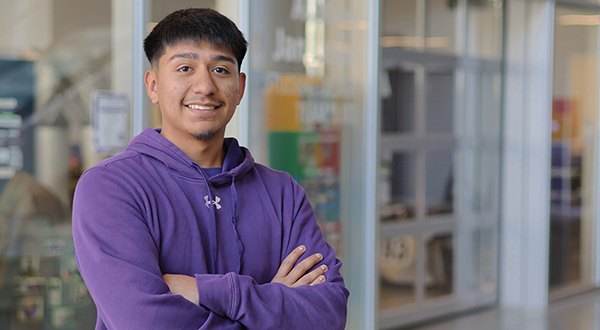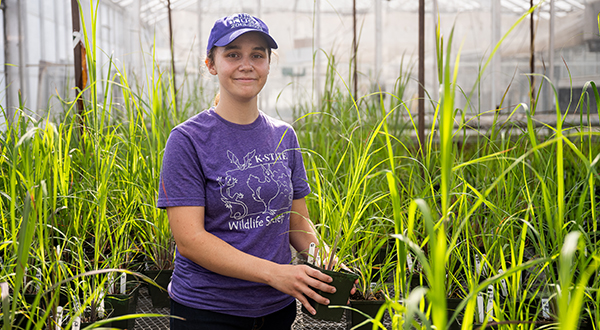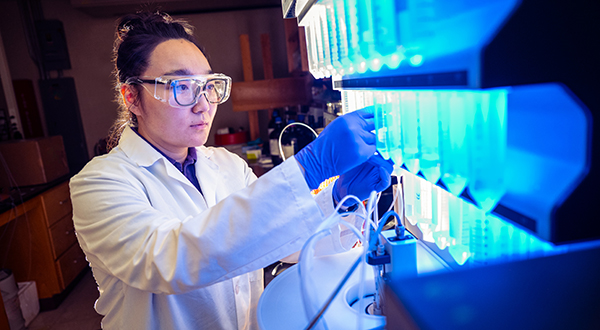This K-State veterinary medicine program sparks next generation of biomedical researchers
Veterinary Research Scholars Program empowers students to pursue groundbreaking research in biomedicine and sustainability.
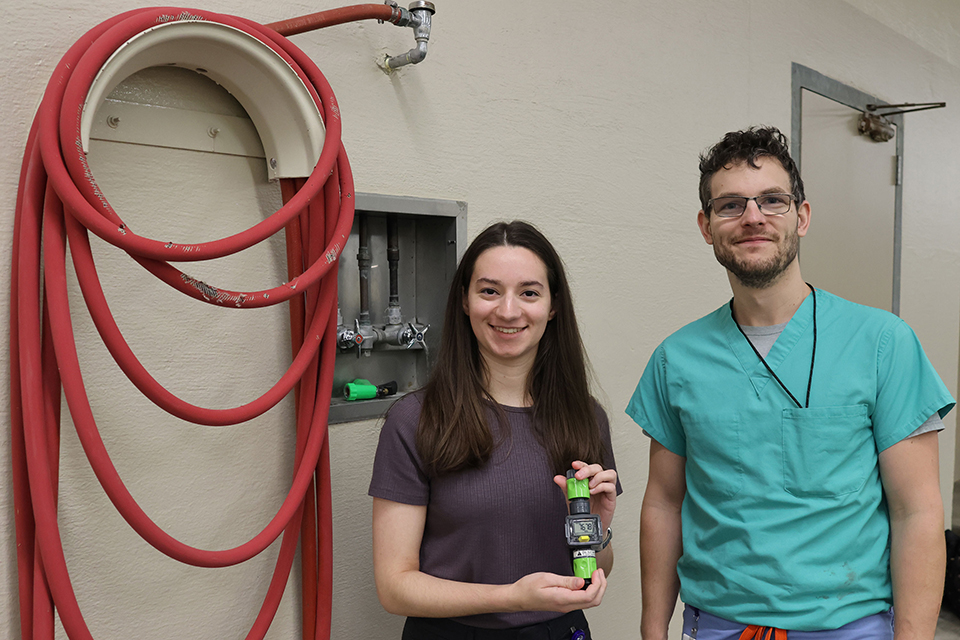 Through the Veterinary Research Scholars Program, third-year veterinary medicine student Gabrielle Maroulis identified sustainability practices at K-State's Veterinary Health Center that have led to significant water savings.
Through the Veterinary Research Scholars Program, third-year veterinary medicine student Gabrielle Maroulis identified sustainability practices at K-State's Veterinary Health Center that have led to significant water savings.
By Joe Montgomery
College of Veterinary Medicine Marketing and Communications
Thursday, Nov. 21, 2024
MANHATTAN — While summer typically means a break for many students, it serves as a unique opportunity for a select group of veterinary students at Kansas State University’s College of Veterinary Medicine to dive deeper into scientific research.
The Veterinary Research Scholars Program, or VRSP, offers students an immersive, hands-on research experience designed to inspire future careers in biomedical research.
For Gabrielle Maroulis, a third-year veterinary medicine student from Roxbury, New Jersey, the VRSP provided a chance to take on new challenges and gain valuable research skills.
“I joined the VRSP in 2023 to learn more about research in veterinary medicine,” Maroulis said. “During my undergraduate studies, I had some exposure to research, and I was interested in broadening my experience during my time as a veterinary student. My experience in the VRSP helped me obtain those goals and more.”
Students explore veterinary research fields, careers
Going beyond the typical internship experience, the VRSP is an intensive three-month program that pairs students with a faculty mentor, learning laboratory techniques, study design and data collection. Students participate in weekly journal clubs and workshops in which they learn about research ethics, presenting research findings and research career opportunities.
At the end of the summer, scholars present their research at K-State’s annual Research and the State poster forum and at the National Veterinary Scholars Symposium.
Kate KuKanich, professor of small animal internal medicine and program director, said that about half of VRSP scholars complete additional training beyond their veterinary medicine doctoral degree, including internships, residencies and graduate degrees.
“Participating in the VRSP can be hugely impactful for a veterinary student’s career, strengthening their research base and opening their eyes to additional career opportunities,” KuKanich said.
Over the past several years, the program has expanded significantly, growing from six scholars in 2018 to 27 scholars in 2024, thanks to a number of grants and donations.
Veterinary Research Scholars Program creates strong faculty mentor connections
Through VRSP, students forge lasting relationships with faculty mentors, relationships that often extend well beyond the summer research experiences. These connections help students gain a deeper understanding of how research can solve real-world problems in veterinary medicine.
“Whether they are in a shelter, on a farm or in a specialty hospital, they are all now better problem solvers with tools to design studies, collect and analyze data, and share results in a meaningful way with their peers and the public,” KuKanich said.
 “Mentoring has never been the same for any two people, and not that it should be,” said Nathaniel Kapaldo, assistant professor of anesthesiology and former VRSP participant. “I learn probably as much from helping a student through a project as they learn about the basics of performing a project."
“Mentoring has never been the same for any two people, and not that it should be,” said Nathaniel Kapaldo, assistant professor of anesthesiology and former VRSP participant. “I learn probably as much from helping a student through a project as they learn about the basics of performing a project."
Maroulis’ mentor, Nathaniel Kapaldo, assistant professor of anesthesiology, has been involved in the VRSP both as a student and a faculty mentor. He sees mentoring as a valuable opportunity for grow as a professional, both for research professors and their students.
“I learn probably as much from helping a student through a project as they learn about the basics of performing a project,” Kapaldo said. “Nothing will bring closer to the surface your own understanding of something, or lack of, than when you must coach another on some topic. I think mentoring affords meaningful opportunities to enhance one’s own teaching and coaching abilities.”
Innovative research experiences across disciplines
VRSP students work with research in a wide range of biomedical fields, including animal, human and environmental health, often falling under the One Health framework that recognizes the interconnectedness of these areas.
The program supports K-State’s land-grant mission and the Next-Gen K-State strategic plan by addressing key challenges through research that benefits both local and global communities.
They frequently involve collaboration with U.S. Department of Agriculture researchers and local producers who partner with the College of Veterinary Medicine.
The research in the VRSP also supports the next-gen theme of academic innovation by going beyond the traditional learning approaches with continuous learning opportunities and a flexible curriculum that fosters academic innovation.
Maroulis’ sustainability research is partnership with Pollution Prevention Institute
While some VRSP research projects focus on topics like animal diseases or medical treatments, Maroulis saw an opportunity to explore sustainability in veterinary practice.
“We were tracking the water and electricity usage in the small and large animal sections of the Veterinary Health Center to determine what the overall consumption is and where sustainable improvements could be made,” Maroulis said. “Currently, we are in the process of writing up the results from the water meter study to publish. This experience helped me develop practical skills I can apply to my future veterinary career, and it was a fun project to be a part of.”
Maroulis’ research was supported by a National Institutes of Health T35 grant, which funds veterinary medicine students conducting research in fields such as animal health, biomedical sciences and environmental sustainability.
"This experience helped me develop practical skills I can apply to my future veterinary career, and it was a fun project to be a part of.”
Additionally, Maroulis participated in training with K-State's Pollution Prevention Institute, housed in the Department of Engineering Extension in the Carl R. Ice College of Engineering.
Over the course of the internship , she learned about pollution prevention, environmental data collection and how to calculate the environmental impact of various projects. Her final case summary is posted on the Pollution Prevention Institute’s website.
“This has been a fantastic collaborative effort within K-State,” said Cris Brazil, pollution prevention specialist. “It was inspiring to see the veterinary hospital was eager to advance their sustainability efforts, and we were excited to provide environmental support through the internship program and other resources.”
Research creates award-winning sustainability at K-State’s Veterinary Health Center
As a full-service veterinary teaching hospital that employs more than 50 veterinarians and 100 staff members, K-State’s Veterinary Health Center, or VHC, presents several opportunities for new and increased sustainability practices, some of which came from Maroulis’ research project’s findings.
“Gabrielle had noticed there was well-documented data for water usage in human health care, but this was not the case for animal care,” said Elizabeth Davis, director of the Veterinary Health Center. “Utilizing information gathered by Dr. Kapaldo and Gabrielle, we made changes in our day-to-day operations that have resulted in significant improvements.”
Even small changes in water-use practices led to big savings in resources.
By installing commercial water meters in the large animal service areas and adding restrictors to hoses and sinks, the VHC was able to reduce water consumption by 13% during the period monitored by Maroulis’ research, from an average of 15,957 gallons per week to 13,883 gallons per week.
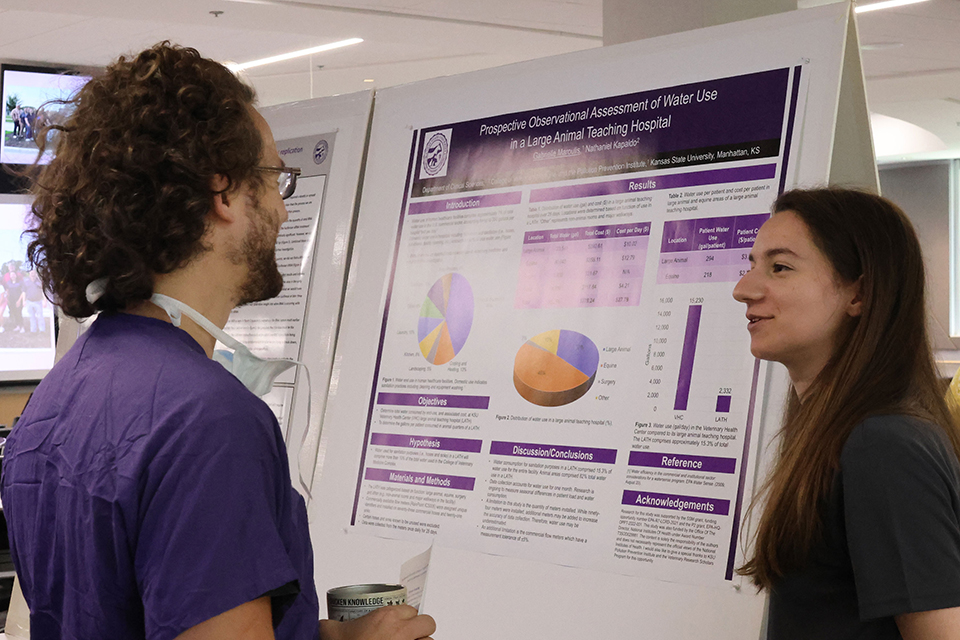 With funding from a stipend provided through the Veterinary Research Program, Gabrielle Maroulis was able to travel and present her research findings.
With funding from a stipend provided through the Veterinary Research Program, Gabrielle Maroulis was able to travel and present her research findings.
Maroulis’ project made such a big splash that it ultimately prompted new practices in the VHC, which were impressive enough to be recognized with a 2024 Environmental Stewardship Award from the Kansas Department of Health and Environment, in August.
This annual award program recognizes projects that eliminate or reduce the generation of pollutants or waste at the source or projects that conserve natural resources. K-State’s VHC was one of only two recipients this year.
Maroulis said she was grateful for the recognition and support from the VRSP and the Pollution Prevention Institute.
“Veterinary medicine is a constantly evolving field, but unfortunately, sustainability often lags behind,” she said. “I hope this project opens the door for future sustainable practices here at Kansas State University and other veterinary hospitals.”
If you are interested in sponsoring or supporting a summer Veterinary Research Scholar like Gabrielle, contact the KSU Foundation.

